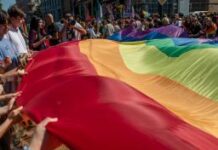NSW Police Force has argued that examining the adequacy and methodology of its landmark report into historical gay hate crimes is not relevant to an inquiry into unsolved deaths.
Key points:
- The inquiry this week is set to focus on NSW Police’s changing approaches to the identification, investigation and recording of suspected hate crimes
- Its judge will determine whether the inquiry needs to probe the adequacy of strike force Parrabell
- NSW Police has accused the inquiry of stalling live investigations due to the work involved in responding to legal requests
That inquiry is holding more public hearings in Sydney as it investigates deaths in the state between 1970 and 2010 suspected of being the result of LGBT hate attacks.
A 2018 report by NSW Police Strike Force Parrabell examined 88 deaths within that period, concluding that 23 remained unsolved.
The inquiry was this week set to focus on the changing approaches from police to the identification, investigation and recording of suspected hate crimes, along with Strike Force Parrabell and its final report.
It has previously been told that, while a report by peak LGBT body ACON found all or most of the 88 cases were “gay hate”-related, the Parrabell report found fewer than one third could be characterised in that way.
On Monday, Mark Tedeschi KC, representing NSW Police, argued the creation of Parrabell and its methodology fell outside the inquiry’s terms of reference.
He told Justice John Sackar those terms made it clear the inquiry was “to avoid unnecessary duplications” and to merely have regard to three previous inquiries, including Parrabell, but not “review the adequacy”.
“It’s clear from the terms of reference that this inquiry is not meant to be a recitation or analysis or assessment of past events,” Mr Tedeschi said.
“Rather, it’s an opportunity for the future to elicit those cases in which further admissible evidence could lead to possible prosecutions.”
Mr Tedeschi said the inquiry was not required to look into a matter if it was “satisfied that the matter has been sufficiently and appropriately dealt with, or will be sufficiently and appropriately dealt with”.
However, the terms of reference specifically direct the inquiry to have regard to the findings of Strike Force Parrabell, Justice Sackar pointed out, which suggested he needed to consider how conclusions were reached.
Counsel Assisting Peter Gray SC said that, subject to the evidence, the question as to whether the Parrabell deaths were motivated by gay hate bias “may not have been sufficiently and appropriately dealt with” by the strike force and its academic review.
NSW Police Force has also accused the inquiry of stalling live investigations because of the work involved in responding to legal requests for documents.
Mr Gray said that allegation was among “various assertions” in recent correspondence between solicitors about summonses.
“The submission which is of a serious nature … asserts that, apparently, because the police have had to answer these summonses, approximately 12 investigations and reviews by the unsolved homicide team have had to be placed on hold,” Mr Gray said.
A solicitor assisting the commission responded that such an allegation was “completely inappropriate, is flatly rejected and should be withdrawn”.
Justice Sackar described the suggestion that summonses “distracted” from police work — which, he said, had been made on two occasions — was unacceptable.
“If it’s intended to put pressure on this commission, it’s not going to work. If it’s intended to be offensive, it worked, because it is offensive,” he said.
“Quite frankly, I’m just happy to dismiss the allegation as a misguided and misconceived assertion by someone who may well have entirely underestimated the resources the New South Wales Police need to perform the tasks.”
Justice Sackar will give a decision about the relevance of Strike Force Parrabell on Tuesday.







